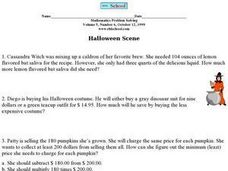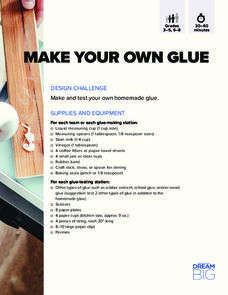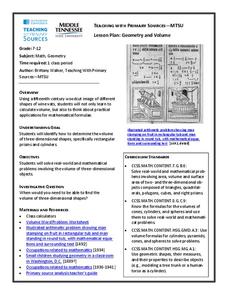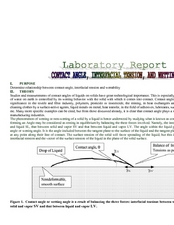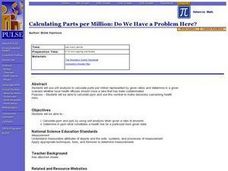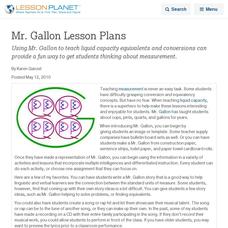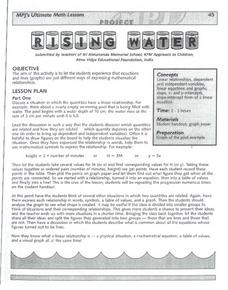Curated OER
Keeping Warm
Young scholars experiment with thermal insulators. In this heat transfer lesson, students predict and then measure heat loss from a cup of water using different materials as insulators. Young scholars complete a line graph to display...
Curated OER
Kitchen Equip and Lab Procedures - Level I
If students use and store kitchen equipment appropriately as well as utilize sanitary work habits, the foods laboratory will be a safe and easy place to work. See Preface Materials: As a motivator ask: "Why should I worry whether or not...
Curated OER
Temperature in the Sun or Shade of the Desert
Third graders use thermometers to measure the air temperature in several
places around the school and then return to the classroom to record the data. They create a bar graph and discuss their findings about the air temperature in the...
Curated OER
Observing Reactions
Students use the scientific method to complete to experiments that have visible reactions. In this visible reaction lesson, students participate in an experiment with melting ice and one with inflating a balloon. Students record their...
Curated OER
Halloween Scene
In this math worksheet, students solve 4 story problems which pertain to Halloween. Students estimate, calculate prices, and convert liquid measures to solve these problems.
Pennsylvania Department of Education
Determine Volume of Solids Using Water Displacement
Young scholars explore math functions by completing math equation worksheets. In this inequality instructional activity, students define a list of math terms and discuss the difference between an equation and inequality. Young scholars...
Columbus City Schools
What’s Up with Matter?
Take a "conservative" approach to planning your next unit on mass and matter! What better way to answer "But where did the gas go?" than with a lab designed to promote good report writing, research skills, and detailed observation. The...
University of Chicago
Don't Be Too Flaky
Snow, ice, and water are all composed of H2O. Does that mean they all have the same volume? Discover the ways that the densities of these substances determine their volumes, and how they change based on their current states of matter....
Rhythm Rhyme Results
Whatʼs the Same and Whatʼs Different?
Learn about radiation, convection, and conduction with a multiple choice worksheet. Each question prompts kids to decide what is different about each form of heat energy transfer, and what is the same.
DiscoverE
Make Your Own Glue
You won't regret being stuck with this activity. By mixing a variety of household items, pupils create their own glue. They test the tensile strength of their glue and compare it to that of other adhesives.
Royal Society of Chemistry
Organic Molecules Day—Chemistry Outreach
In search of an organic lab that employs real-life techniques and analysis methods? Groups carry out the nitration of methyl benzoate, then attempt to determine the number and location of the nitro groups added to the benzene ring....
Virginia Department of Education
Geometry and Volume
The history of math is fascinating! Utilize a woodcut primary source image from 1492 and posters from the 1930s to help geometers apply their volume-calculation skills to real-life questions.
Curated OER
Matter
Students complete a unit of activities to learn about states of matter and how to measure matter. In this matter activity, students complete 8 lessons to learn about matter, its states, and how to measure matter.
Curated OER
Contact Angle. Interfacial Tension and Wetting
Students determine the contact angle of water on different surfaces. In this physics instructional activity, students calculate their percent error using a mathematical formula. They explain the advantages of using non-wetting surface...
Curated OER
Warming by Freezing
Ninth graders discover the reasoning behind spraying water on fruit and seedlings in preparation for hard freezes. In this conceptual physics lesson plan, 9th graders conduct an experiment to measure the heat released when water goes...
Curated OER
The Three States of Matter
Students explore the three states of matter. In this physics lesson, students are shown examples of solids, liquids, and gases. Students make cookies and identify the three states of matter during the baking process.
Curated OER
Calculating Parts per Million: Do We Have a Problem Here?
Students calculate ppm and ppb by using unit analysis when given a ratio of amounts.
They determine in ppm what constitutes a health risk for a particular toxin given data
and whether local health officials should close a lake...
Pennsylvania Department of Education
Length and Perimeter
Third graders explore tessellations and the spatial concepts used in creating them. For this tessellations lesson, 3rd graders rotate, reflect and transform shapes to create tessellations. Students become familiar with the vocabulary...
Curated OER
The Relationship Between Salinity and the Density of Water
Students investigate density and salinity of water. In this density and salinity lesson plan, students find the density of objects and liquids and show the relationship between the salinity and density of water. Students add salt to...
Curated OER
Mr. Gallon Lesson Plans
Using Mr. Gallon to teach liquid capacity equivalents and conversions can provide a fun way to get students thinking about measurement.
Curated OER
Metric Mania
In this metric system worksheet, students convert measurements of volume from the English system of measurement to the metric system. They also convert within the metric system and answer questions about volume measurements.
Curated OER
Rising Water!
Students observe water change from a liquid to a gas state when heated and then return to its liquid stage when cooled. They learn that gas molecules move faster than liquid molecules. They discover physical properties that describe how...
Curated OER
Physical and Chemical Properties of Matter
Students identify the physical and chemical properties of matter. They review the types of matter. Students list the four states of matter (Solid, Liquid, Gas and Plasma). They recognize and describe the different types of matter.
Curated OER
Beverage Tests
Learners investigate the pH of a liquid. In this middle school mathematics/science lesson, students collect and analyze data regarding the pH of various liquids. Learners display their data in various types of graphs as they consider...






